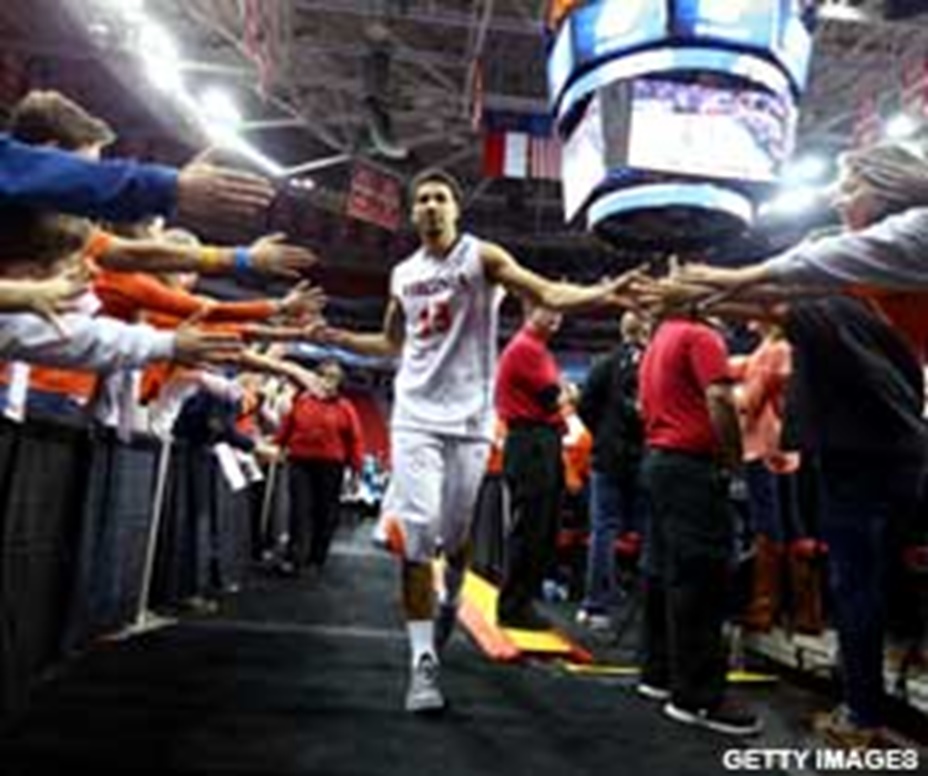A large majority of the general public "opposes paying salaries to college athletes beyond the scholarships currently offered," according to poll results cited by Alex Prewitt of the WASHINGTON POST. The poll, which was conducted by the Post and ABC News, shows that only 33% "support paying college athletes." At 64%, opposition "is nearly twice as high as support," with 47% "strongly against the idea." Nearly "every demographic and political group opposes it except non-whites," of which 51% support paying players. The breakdown among whites -- 73% oppose, 24% support -- "tilted strongly in the opposite direction, echoing the perspective of NCAA President Mark Emmert." However, the public "was split evenly when asked about the proposition of allowing college athletes to form a union to negotiate their rights and working conditions," with 47% supporting and 47% opposing (WASHINGTON POST, 3/23). On Long Island, Ellis Henican wrote under the header, "NCAA's True March Madness: Not Paying The Players." Henican: "Shouldn't the players get something more than scholarships? Don't we have antitrust laws and a minimum wage? Paying them nothing while everyone else rakes it in -- that's the real March Madness here" (NEWSDAY, 3/23).
HOT TOPIC ON SUNDAY NEWS SHOWS: USA Today's Christine Brennan and the N.Y. Times' Joe Nocera yesterday appeared on ABC News' "This Week With George Stephanopoulos" to discuss the issue of compensation for NCAA athletes. Nocera said, "In effect, you have a multi-billion-dollar business with a free labor force. ... And I'm not saying they should get a million dollars or $2 million, but I am basically saying that given the fact that they're not student-athletes, they're athlete students, they deserve some compensation." Brennan countered, "If you pay the football players, according to my experts, you have to pay the field hockey players or you have lawsuits galore. And, in fact, just three years ago, the NCAA tried to do this by paying football (players) $2,000, as you know, a stipend. ... And that was just roundly defeated." Nocera responded, "Football and men's basketball are a different category of sports than anything else. The athletes are there, first and foremost, not to get an education. ... So I do think it's a different case. And you're right, there would be litigation. That's OK" ("This Week With George Stephanopoulos," ABC, 3/23).
FROM THE DESK OF THE PRESIDENT: NCAA President Mark Emmert and U.S. Secretary of Education Arne Duncan yesterday appeared on NBC's "Meet The Press." Host David Gregory asked, "Why isn't this unfair, not to compensate these athletes who are creating so much value?" Emmert answered, "Basically, what is being argued here is should student-athletes, whether they're basketball players or any other sport, be unionized employees of a university, or is this fundamentally about students playing the game and receiving the most important thing that's going to set them up for the rest of their life: a good, sound, education and the opportunity to get that education. Obviously, universities and colleges believe that these are student-athletes, that these are young men and women who should continue to be students and not be unionized employees." Gregory: "To suggest it's not a business when you're making almost a billion dollars in TV revenue, most of which comes from March Madness, strikes a lot of people as disingenuous." Emmert replied, "Absolutely March Madness generates a lot of revenue. That revenue is used to support all of the other tournaments, divisions one, two, and three." He said of stipends for student-athletes, "The rules of the NCAA aren't made by me or anybody on the staff. They're made by the members themselves. And we have twice now had the board of the NCAA pass an allowance to allow schools to provide a couple of thousand dollars in what we call 'miscellaneous expense' allowances." Duncan said of the incentive structure for college coaches, "We have to change these incentive structures so graduation rates are the most important thing. And to Mark and NCAA's credit, they've raised the bar" ("Meet The Press," NBC, 3/23).
OFF HIS MARK? The AP's Jim Litke wrote Emmert is "the most prevaricating man in the world," as well as a "tone-deaf monarch whose organization is being sued left and right, mostly by former college players seeking a few crumbs from the ever-expanding NCAA revenue pie they helped bake" (AP, 3/23).




